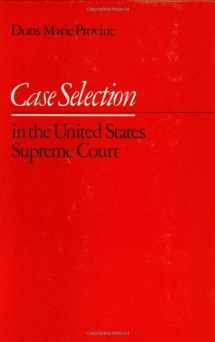
Case Selection in the United States Supreme Court
Book details
Summary
Description
For decades the Supreme Court has received more requests for review than it can possibly grant; it now rejects more than ninety percent of the petitions which fulfill jurisdictional requirements. Consequently, the process by which the justices select cases must be recognized as one of the most important aspects of the Court's work. But because it is hidden from public view and proceeds by secret ballot, the case-selection process has never been thoroughly analyzed.
This concise and accessible study provides an intimate view of the Court's case-selection process through an analysis of the docket books and other papers of Justice Harold H. Burton, who kept scrupulous records of the Court's work from 1945 to 1957. In her analysis of these invaluable records—the only records of case-selection votes made public since the advent of discretionary review in 1925—Provine provides two perspectives on the problematic issue of judicial motivation in case selection. The first perspective is an institutional one in which the Court is treated as the unit of analysis: the second is personal, in which differences among decision makers are the focus of analysis. Provine suggests that judicial role perceptions go far to explain both agreement and disagreement in case selection. She also considers the impact of the process upon litigants, since the system seems to favor petitioners with litigation expertise, especially the U.S. government. Yet, she claims, the secrecy of case selection fosters the popular misperception that any worthwhile case can be appealed "all the way to the Supreme Court." The Court thus maintains its image as a forum equally available to all litigants.


We would LOVE it if you could help us and other readers by reviewing the book
Book review



